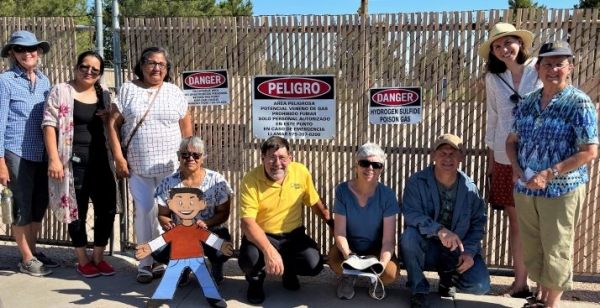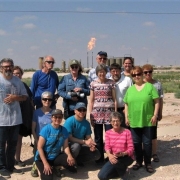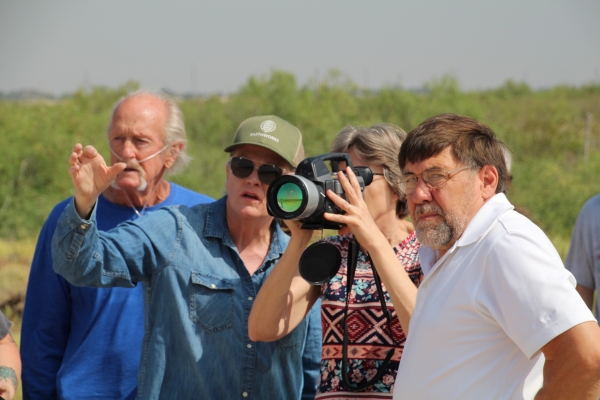EPA Announces Methane Rules to Care for Communities and Climate
The environmental and climate justice communities in New Mexico celebrated the Environmental Protection Agency’s revised rules on methane emissions, which were posted on Saturday. The announcement was made in conjunction with this year’s global climate summit, known as COP28, in Dubai.
The strengthened rules seek to
- Ensure frequent leak detection and repair inspections at all wells, including regular monitoring of small, leak-prone wells.
- Stop the wasteful and polluting practice of routine flaring of associated gas from oil wells.
- Allow community monitoring data collected from frontline communities and other third parties to assist EPA in the implementation and enforcement of the methane safeguards.
- Require monitoring and plugging of abandoned wells that are leaking methane.
“People of faith and conscience in New Mexico and El Paso Interfaith Power & Light have worked to support strong EPA methane rules for nearly a decade. After countless hearings, faith letters, and public comments we are grateful for the ethical and moral leadership the EPA is taking. Over the years alarm and concern for community health, environmental justice, and caring for our sacred climate have grown and we must continue to act.” said Sister Joan Brown, osf, Executive Director, Interfaith Power & Light New Mexico & El Paso.
When implemented and enforced, these rules will keep the U.S. on track to meet its global promise of reducing methane 30% by 2030 and 80% by 2038!
The climate-heating gas first became a widely known issue in New Mexico in 2014 when NASA satellite images showed the methane hotspot over the Four Corners area of New Mexico.
Peer-reviewed science indicates that living within half-a-mile of oil and gas production facilities is clearly correlated with negative health impacts including cancer, respiratory illness, fetal defects, blood disorders, and neurological problems.
According to those same scientific studies, the health of almost 7 percent of our residents (primarily in southeast New Mexico, but also San Juan County) is threatened by emissions and leaks from oil wells and other facilities.
 Kayley Shoup, an organizer with Citizens Caring for the Future, said in a June 2023 interview that every time she hears about a child or teenager in the Permian Basin being diagnosed with a rare cancer or leukemia, she’s made it a point to find out how close they live to oil and gas facilities. She said nine times out of ten, the children are living within close distance to an oil or gas facility.
Kayley Shoup, an organizer with Citizens Caring for the Future, said in a June 2023 interview that every time she hears about a child or teenager in the Permian Basin being diagnosed with a rare cancer or leukemia, she’s made it a point to find out how close they live to oil and gas facilities. She said nine times out of ten, the children are living within close distance to an oil or gas facility.
“I really think that it can’t be understated just how much of a health risk these things pose when they’re close to schools, or they’re close to homes, and that distance really does make a difference in what health impacts folks are dealing with,” she told the New Mexico Political Report.
New Mexicans Speak Out
Over the past decade or so, thousands of New Mexicans have spoken out in favor of strong methane and ozone rules in the Obama, Trump, and Biden administrations.
“It is the responsibility of each of us to protect the planet with every small action that affects it. This is why I’m grateful for the Environmental Protection Agency’s (EPA) recent steps to regulate methane and other dangerous emissions from oil and gas facilities across the country,” Rev. Nick King, a Mennonite pastor in Carlsbad, NM, said in an opinion piece in the Albuquerque Journal in January of 2022, during the comment period on the proposed rules.
Additionally, Gov. Lujan Grisham’s administration has passed nation-leading methane and ozone safeguards that have provided a strong model for the rules the EPA is releasing. And importantly for families in New Mexico’s Permian Basin, federal protections will apply to extraction in Texas, where methane emissions are nearly unregulated.
“Reducing methane pollution from the oil and gas industry is the fastest, most cost-effective way to slow the rate of climate change and avoid the further escalation of unpredictable, severe, and catastrophic weather events like those we’ve seen in New Mexico including the wildfires and subsequent floods that ravaged the northern part of the state and the heat dome we experienced this summer,” said a press release posted by coalition of environmental and climate justice organizations working on cutting emissions.
 “People of faith and conscience, with a shared commitment for stewardship of our Sacred Earth, applaud the EPA for these rules to address harmful methane pollution. At a time when nations are meeting for the international climate conference in Dubai, the final EPA rules show the U.S. is serious about its moral responsibility to reduce methane pollution. The rules will help address the climate crisis by decreasing methane in our air, and it will help protect the millions of people living on the frontlines of oil and gas development across the country,” said Rev. Susan Hendershot, national IPL President. Read the national IPL press statement.
“People of faith and conscience, with a shared commitment for stewardship of our Sacred Earth, applaud the EPA for these rules to address harmful methane pollution. At a time when nations are meeting for the international climate conference in Dubai, the final EPA rules show the U.S. is serious about its moral responsibility to reduce methane pollution. The rules will help address the climate crisis by decreasing methane in our air, and it will help protect the millions of people living on the frontlines of oil and gas development across the country,” said Rev. Susan Hendershot, national IPL President. Read the national IPL press statement.


